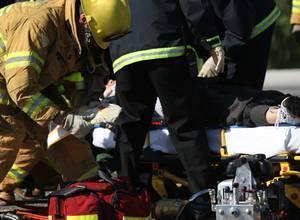Facing Intoxication Manslaughter in Texas
 Prosecutors charge a defendant with manslaughter when the defendant unintentionally kills someone through his or her reckless behavior. Many states have different classifications of manslaughter, including vehicular manslaughter for when a driver acts recklessly. Texas law has a charge of intoxication manslaughter that is separate from vehicular manslaughter. Texas prosecutors bring intoxication manslaughter charges against defendants involved in fatal accidents who are suspected of driving while intoxicated. Defendants who are convicted of intoxication manslaughter may receive severe penalties.
Prosecutors charge a defendant with manslaughter when the defendant unintentionally kills someone through his or her reckless behavior. Many states have different classifications of manslaughter, including vehicular manslaughter for when a driver acts recklessly. Texas law has a charge of intoxication manslaughter that is separate from vehicular manslaughter. Texas prosecutors bring intoxication manslaughter charges against defendants involved in fatal accidents who are suspected of driving while intoxicated. Defendants who are convicted of intoxication manslaughter may receive severe penalties.
Intoxication Manslaughter Charges
The difference between vehicular manslaughter and intoxication manslaughter is the allegation of intoxicating substances being involved the incident. The victim can be someone in another vehicle, a passenger in the defendant’s vehicle or a pedestrian. In order to prove intoxication manslaughter, the prosecution must show that:
- The defendant was legally intoxicated while operating a vehicle; and
- The intoxication was a cause of the accident that resulted in a fatality.
For vehicular manslaughter cases, the prosecution is required to prove that the defendant was reckless in his or her actions. However, Texas law presumes that a driver is reckless if he or she is legally intoxicated. There is also no comparative fault in criminal cases. The victim’s actions may have partially caused the accident, but the defendant can still be convicted if he or she was also at fault.
Penalties
Texas defines all manslaughter as a second-degree felony. Though not as severe as a murder, a manslaughter conviction can result in:
- Two to 20 years in prison;
- As much as $10,000 in fines;
- Probation or community service; and
- A loss of driving privileges.
Because the law gives a wide range of possible penalties, a court can use its discretion to assign longer prison sentences and higher fines for intoxication manslaughter convictions. Whether the defendant is convicted or not, the victim’s family may also file a wrongful death lawsuit. The burden of proof to be awarded damages is less for plaintiffs in a civil case than for prosecutors in a criminal case.
Defenses
There are a couple of ways to combat intoxication manslaughter charges:
- The prosecution must prove that the defendant was legally intoxicated, commonly by citing a blood alcohol content test or field sobriety test. Without those tests, the evidence will rely on testimony about the defendant’s condition;
- A person who was involuntarily intoxicated, such as being drugged, is not held responsible for his or her actions in a fatal accident; and
- The defendant’s intoxication may have no connection to the cause of the accident.
Getting Legal Representation
Regardless of whether you were at fault, you may feel guilty after being involved in a fatal accident. However, you must make an effort to defend yourself against criminal charges. A San Antonio DWI defense attorney at the Law Offices of Sam H. Lock can represent you in your intoxication manslaughter case. Schedule your consultation by calling 210-226-0965.
Source:
http://www.statutes.legis.state.tx.us/Docs/PE/htm/PE.49.htm





